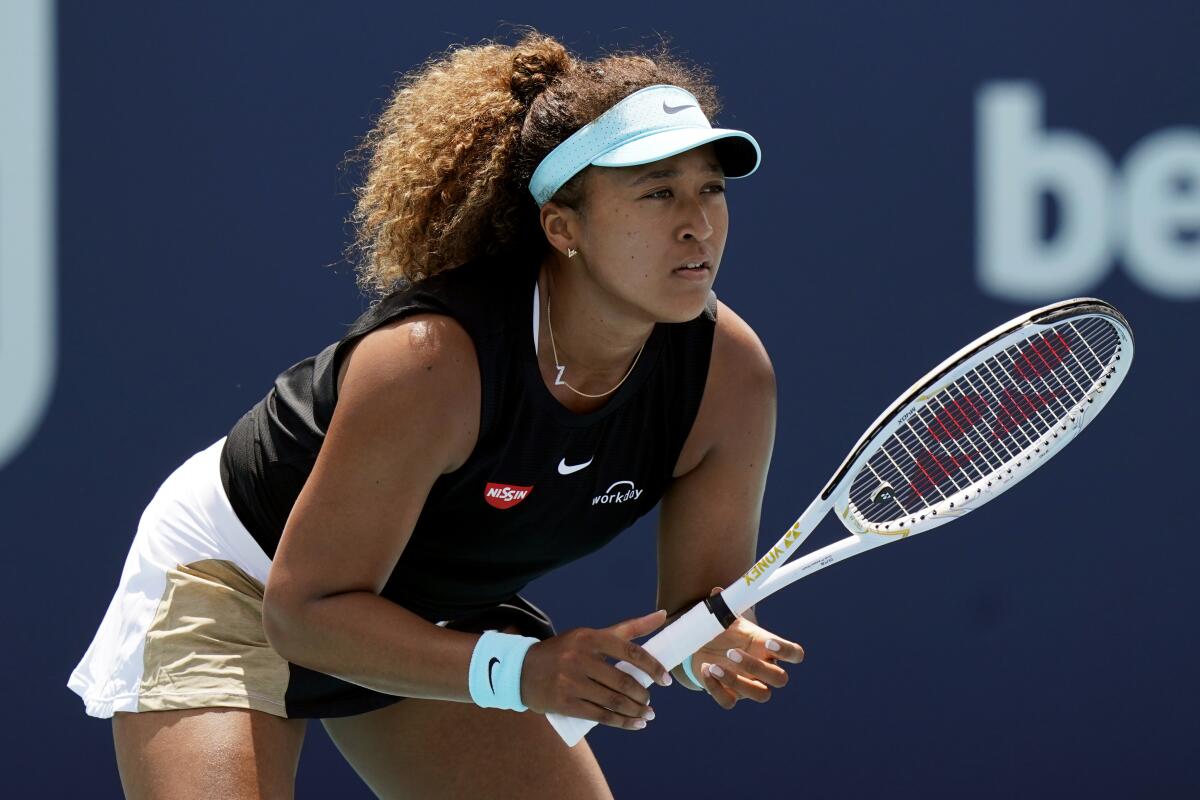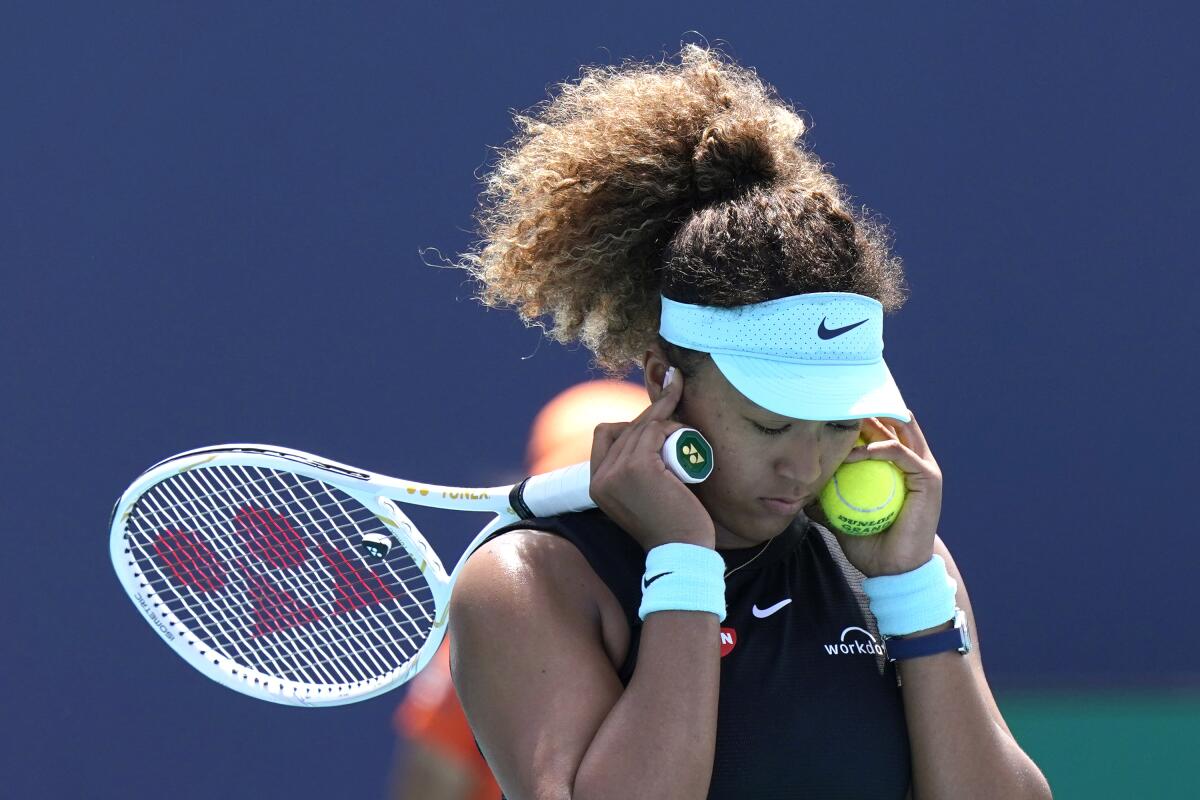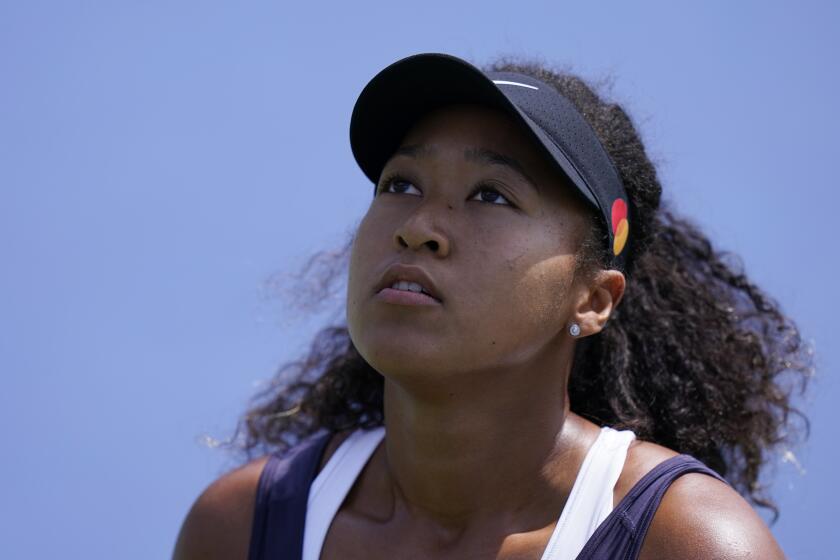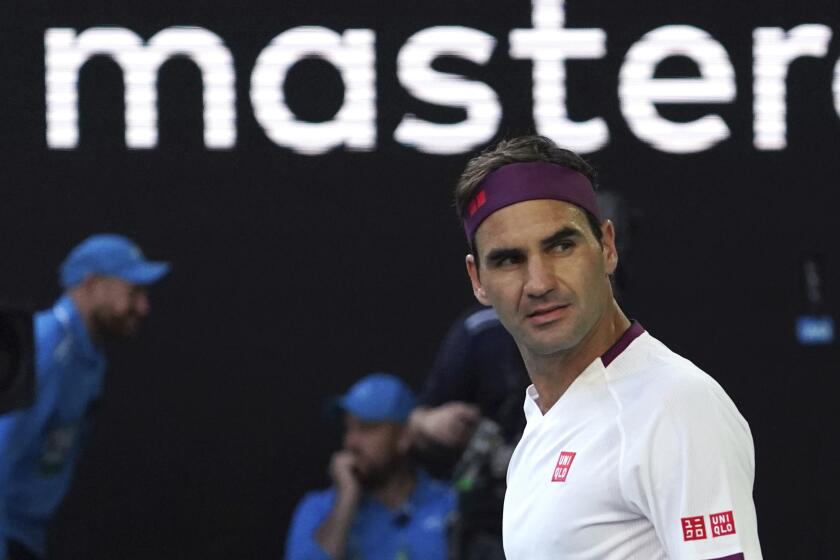Column: Why Naomi Osaka’s news conference boycott is a major tennis talking point

- Share via
(Editor’s note: Naomi Osaka withdrew from the French Open after this column was published. Helene Elliott immediately wrote another column, saying Osaka needs empathy and help, not condemnation, for revealing her issues with depression.)
When nine women rebelled against the sexism and meager pay that prevailed in professional tennis and formed their own tour in 1970, they turned to the media to publicize their cause. In addition to making appearances at shopping centers and tennis clubs, they’d meet with sports editors at newspapers in each city they visited and urge local TV stations to cover their events, forging relationships that were instrumental to the growth of women’s tennis.
“We spent more time promoting than we probably did playing,” icon Billie Jean King, one of those rebels, told The Times last year while discussing the 50th anniversary of the group’s bold move. “We learned what we needed to make this happen because if the traditional media didn’t tell our story, we were nothing.”
Times have changed and social media now allows athletes to shape their image directly to the masses, without filters. Four-time Grand Slam singles champion Naomi Osaka widened the gulf between players and traditional media this week by saying she won’t attend news conferences at the French Open, citing a “disregard for athletes’ mental health.” She said she hopes the hefty fines she gets for breaking tournament regulations “will go towards a mental health charity.”
Naomi Osaka’s courage following the Jacob Blake shooting, likely lost on most while wildcat player strikes spread across team sports, shouldn’t be overlooked.
The 23-year-old Los Angeles resident has become the face of the sport because of her charisma and excellence. Born in Japan to a Japanese mother and Haitian father, Osaka was the highest-earning female athlete in the world each of the last two years, according to Forbes, and she’s expected to be a star at the Tokyo Summer Olympics. She has a contract with the Japanese TV channel WOWOW.
King, ever an avid promoter of the sport at 77, felt conflicted when she heard of Osaka’s decision. “I fully admire and respect what Naomi is doing with her platform, so I am a little torn as I try to learn from both sides of this situation,” King said Friday via email. “While it’s important that everyone has the right to speak their truth, I have always believed that as professional athletes we have a responsibility to make ourselves available to the media. In our day, without the press, nobody would have known who we are or what we thought. There is no question they helped build and grow our sport to what it is today.
“I acknowledge things are very different now with social media and everyone having an immediate ability to speak their truth. The media still play an important role in telling our story. There is no question that the media needs to respect certain boundaries. But at the end of the day it is important we respect each other and we are in this together.”
Osaka, 23, has rarely faced harsh questions or criticism since she rose to prominence by winning the BNP Paribas Open at Indian Wells in 2018. Most often she faces the standard “How did it feel?” from friendly outlets. She has discussed social issues thoughtfully. She has been humble, self-deprecating, and funny.

Her plan to avoid news conferences in Paris — where she’s seeded No. 2 and is scheduled to face Patricia Maria Tig on Sunday — triggered debates over the custom of requiring athletes to attend news conferences soon after they compete. The need to publish information quickly makes it impractical for media to wait hours for an athlete to cool off. Athletes might wish for more time before they speak, but news conferences provide them the chance to promote the sport, advocate for causes, and build connections with fans and sponsors. Both sides benefit.
Osaka announced her plan on Twitter and Instagram. “Hey, everyone — hope you’re all doing well, I’m writing this to say I’m not going to do any press during Roland Garros. I’ve often felt that people have no regard for athletes mental health and this rings very true whenever I see a press conference or partake in one,” she wrote. “We’re often sat there and asked questions that we’ve been asked multiple times before or asked questions that bring doubt into our minds and I’m just not going to subject myself to people that doubt me. I’ve watched many clips of athletes breaking down after a loss in the press room and I know you have as well. I believe that whole situation is kicking a person while they’re down and I don’t understand the reasoning behind it.
“Me not doing press is nothing personal to the tournament and a couple journalists have interviewed me since I was young so I have a friendly relationship with most of them. However, if the organizations think that they can just keep saying, ‘Do press or you’re going to be fined,’ and continue to ignore the mental health of the athletes that are the centerpiece of their cooperation then I just gotta laugh. Anyways, I hope that considerable amount that I get fined for this will go towards a mental health charity.”
Roger Federer, making his return from injury at the French Open, should go down in history as the greatest player — and sports icon — of all time.
Rafael Nadal, soon to begin pursuit of his 14th title on the red clay of Roland Garros Stadium, said he respects Osaka and her decision but he sees great value in news conferences. “I mean, we as sports people, we need to be ready to accept the questions and try to produce an answer, no?” he said. “I understand her but in the other hand, for me, I mean, without the press, without the people who normally are traveling who are writing the news and achievements that we are having around the world, probably we will not be the athletes that we are today. We’re not going to have the recognition that we have around the world, and we will not be popular, no?”
Ash Barty of Australia, the No. 1 female player in the world, considers interviews to be part of her job. “At times press conferences are hard, of course, but it’s also not something that bothers me,” she said. “I’ve never had problems answering questions or being completely honest with you guys. It’s not something that’s ever fazed me too much.”
Mental health issues shouldn’t be downplayed. If players are adversely affected by the timing of post-match news conferences, the Women’s Tennis Assn. should steer them toward counseling. If there’s a better way to do things, now is the time to discuss it.
More to Read
Go beyond the scoreboard
Get the latest on L.A.'s teams in the daily Sports Report newsletter.
You may occasionally receive promotional content from the Los Angeles Times.













